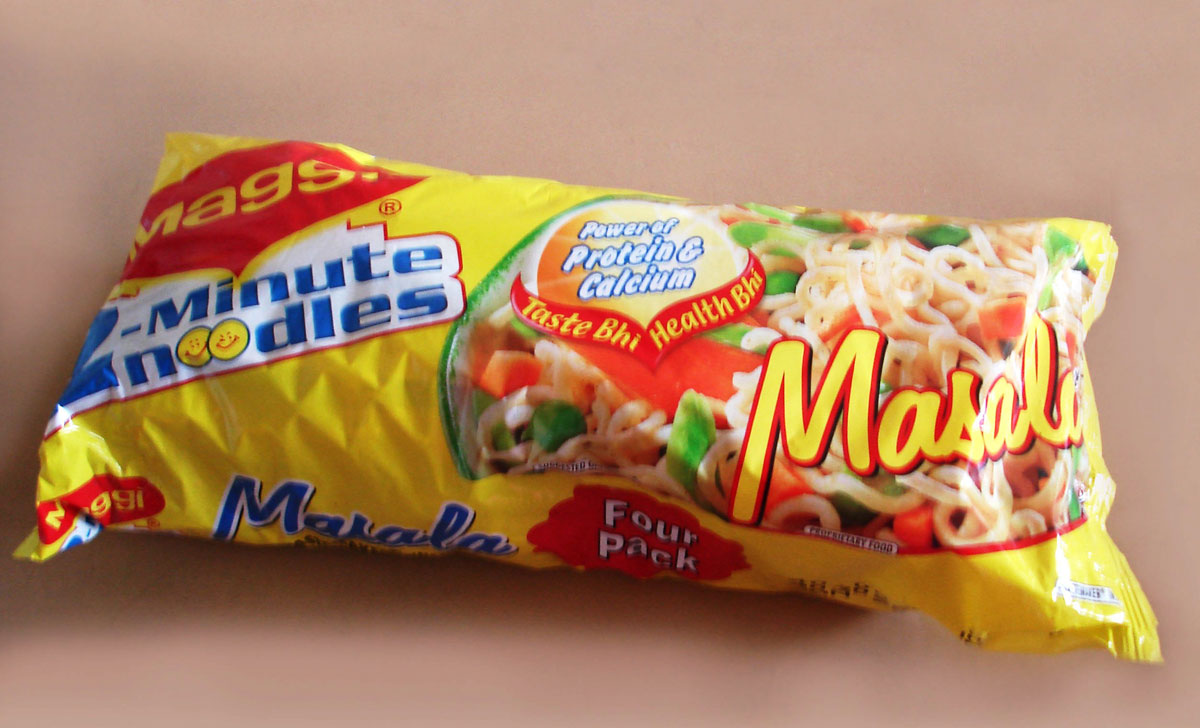MAGGI IN A SOUP
A pack of the popular Indian Maggi noodles. (Sixth6sense | Wikimedia Commons)
Nestle South Asia is busy incinerating $50 million worth, 400 million packets of Maggi noodles, undeniably its most popular brand that exists in the Indian market since 1984 and dominates 80% of it. The fiasco, as most Maggi lovers understand it, was initialed on April 30 when the Uttar Pradesh Food & Drug administration banned the product calling it “dangerous and unfit for human consumption,” writes Priyanka Bhardwaj.
The basis of the ban were laboratory tests, on some samples of the two-minute food snack, reporting lead and flavor enhancer monosodium glutamate (MSG) contents in excess of permissible limits.
The content of lead was found to be 2.8 PPM to 5 PPM (particles per million) instead of the prescribed limit of 2.5 PPM.
Subsequently, as more samples tested positive for lead and MSG, the Food Safety & Standards Authority of India (FSSAI) ordered Nestle India to withdraw and recall all variants of Maggi noodles from all over the country.
As the controversy unfolded the Swiss food giant simply disputed the findings, clarifying that the above said chemicals were negligible in amount and less than even 1%, even as it recalled all packets from the markets and distribution network.
However, as the media hyped the issue and a series of states took to banning the product, global CEO Paul Bulke descended upon New Delhi to explain the MNC’s stance and that it has rigorous inbuilt quality policies and testing protocol to guarantee safety from raw material selection to processing and packaging.
Sources in Nestle India point out that various state governments are yet to provide them with formal test reports conducted on Maggi noodles and that some states have declared the instant noodle brand safe.
Apparently the company and regulators are at loggerheads for occupying polar positions on issues of compliance and methods adopted for the tests, and the firm has made an appeal in the Bombay High Court.
![]()
Though the firm has been unable to obtain a stay on the FSSAI’s ban, the court has issued a notice to FSSAI and a legal hearing is slated for June 30.
Undoubtedly, the slow and tepid response of the $100 billion Swiss food major failed to contain the damage being wrought on its Maggi brand that has accrued Rs. 25 billion, amounting to 30% of its revenue share.
27,420 tons of Maggi are now finding way into power generation by six cement factories in what is the largest ever recall within packaged foods by Nestle in over a century, estimated to stretch to 45 days.
The procedure is expected to engage 10,000 trucks, 1,600 sales staff, nearly 12,000 people in the market and distribution chain, and 12 storage spaces.
The impact of the ban, albeit temporary, has rendered 1,500 Nestle employees involved in production of the instant noodles across five plants jobless, and efforts are being made to either relocate some to manufacture other items like dairy products, ketchup and infant nutrition, and incorporate the rest in “team building and other HR activities.”
Paras Spices, the largest supplier of spices used in Maggi, has asked its 200 workers to either not report to work or work only two to three days a week.
This spice company states a loss of 45% of its business which came only from Nestle.
Besides Maggi, other brands of edibles have also come under the scanner of the FSSAI and if bans as these are promulgated it will surely have far reaching implications as India is the world’s fifth-largest instant noodles market, valued at $38 billion.
Hindustan Unilever, a leading FMCG player, has recalled its Chinese range of Knorr instant noodles in mid-June as the product was not approved by FSSAI.
With rise in intensification of stand against food adulteration, the southern province of Kerala has announced a first of its kind initiative to install a series of mobile testing laboratories at check posts to examine the quality of food articles, including milk, milk products, oil and water, coming in from the neighboring states.
With regulators in Singapore giving the green signal for the sale of Maggi, questions are also raised on the veracity of tests by Indian regulators, their testing mechanisms and standards, technology, accreditation and powers to issue penalties for non-compliance.
To plug this loophole a Health Ministry-led proposal costing Rs.17 billion has come up for rebooting of the regulating machinery for ensuring food safety and standards.
Maggi may be in a soup for the time being and alarmed at the possible erosion of consumer loyalty but considering the strong fundamentals of Nestle in holding on to the snacking opportunity it is nobody’s guess that it will be back on retail shelves in alternate, innovated forms, either in the form of ready-to-eat or ready-to-cook food or a new avatar.


